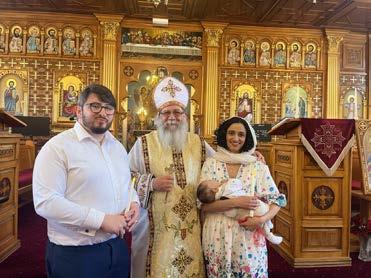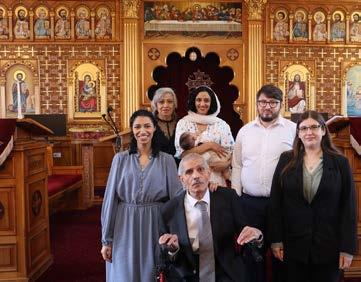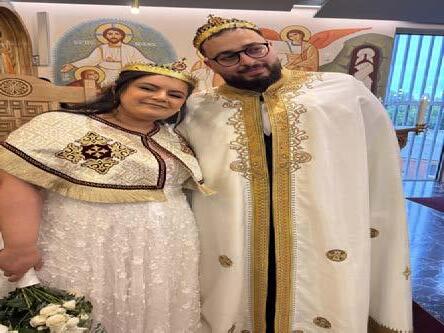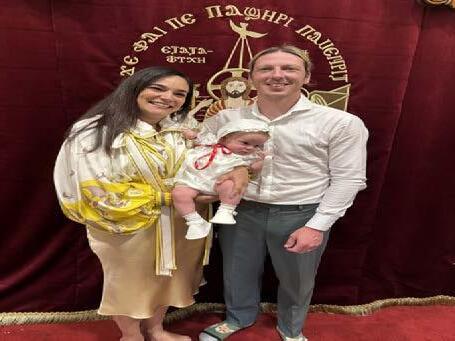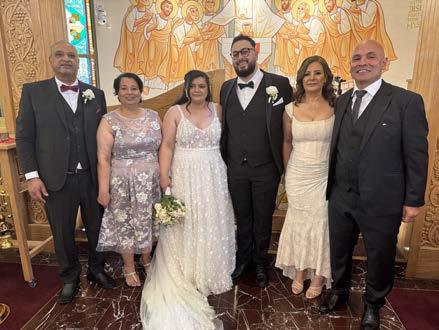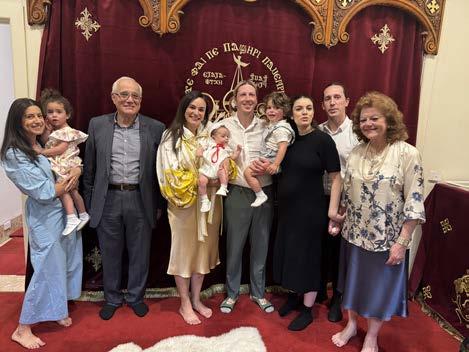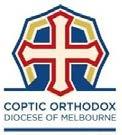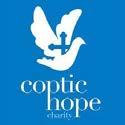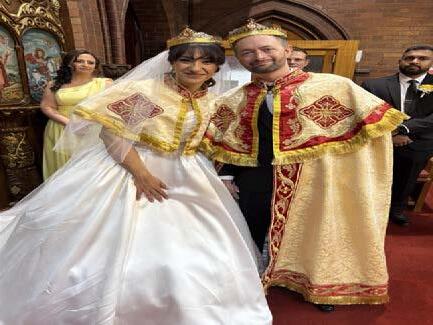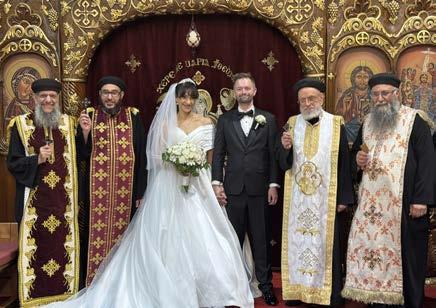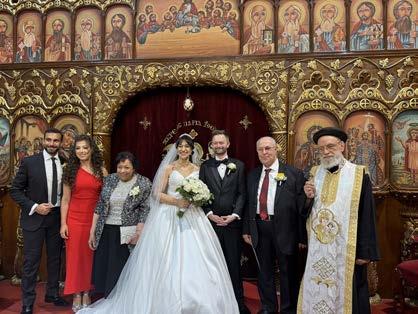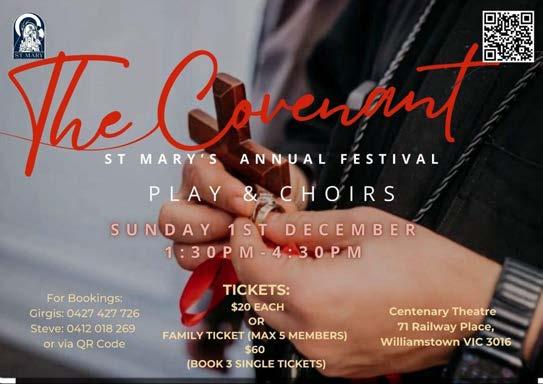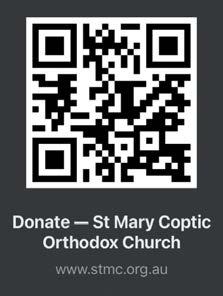
Services at St Mary’s Church
Monday:
Mass 9 - 11 am
Tuesday
Liturgy 5:30 - 7am
7:30pm The Way Orthodox Fellowship in Englisg for adults - All ages
Wednesday: Mass 9 – 11 am
6:30-8pm School of Deacons Adults
Thursday
Mass 9 - 11 am - English
English Midnight Praises 7:30pm
English Bible Study 7:30pm
Friday: Mass Mass 9 – 11 am
Youth 25 and above 7-9pm
Discipleship Clas Class 7-8:30pm
Saturday: Mass: 8:30 – 11am
Sunday School 4 – 5.30pm
Vespers & youth meeting 7-8:30pm English
Vespers &Bible Study Arabic 5:30-7pm
Scouts 1:30 - 3pm
School of Deaconsgip 3 - 4pm
Sunday:
1st Mass 6:30 - 8:30 Arabic & English
2nd Mass.8:30 - 10:30 English - St Mary’s
Church
3rd Mass 8:30 - 10:30 Arabic - St John’s
Chrysostom Church
Family Meeting fortnightly 11:30am
Hymns Class - English 11:45 - 12:30pm
Church Priests:
Fr Tadros Sharobeam 0414251251
Email: frtadros@me.com
Fr Habib Girgis Younan: 0401238177 – 94498871
Email: habibgirgisyounan@hotmail.com
Fr Michael Salib: 0422431821
Email: frmichael@sac.edu.au
Church Address: 5 Epsom Rd., Kensington Vic 3031 Tel: 93766651
Fr Kerillos Tawadros 0411 518 399
Fr John Makary 0433 445 636
The Martyrdom of Saint Mari-Mina, the Wonder Worker
24th November - 15th Hator
On this day St. Mina, who is called the blessed faithful, was martyred. His father, Eudoxius, was a native of the city of Nakiyos (Nikiu( and was its Governor. His brother was envious of him and he brought charges against him before the Emperor. The Emperor transferred him to Afrikia and appointed him Governor over it. The people were pleased with him because he was merciful and God-fearing.
His mother Euphemia had no children. One day she went to church on the feast of our Lady, the Virgin, the Mother of God, at Attribes. She saw the children in the church wearing their beautiful clothes with their parents. She heaved a sigh and wept before the icon of Our Lady St. Mary, entreating her to intercede for her before her beloved Son, in order that He would give her a son. A voice came from the icon saying, “Amen.” She rejoiced in what she had heard and realized that the Lord had heard her prayers. When she returned to her home and told her husband about it, he replied, “May God’s Will be done.”
The Lord gave them this saint and they called him Mina, according to the voice that his mother heard. When he grew, his parents taught him reading and writing and they reared him in a Christian manner. When he was eleven years old, his father departed at a good old age. Then his mother departed three years later. St. Mina devoted his life to fasting, praying and to living a Christian life. Because of everyone’s love towards him and his father, they placed him in his father’s position. In spite of that, he did not forsake his worshipping.
When Diocletian had reneged Christianity and issued his orders to worship idols, many were martyred for the Name of the Lord Christ. St. Mina left his position and went to the desert, where he stayed many days worshipping God with all his heart.
One day he saw the heavens open and the martyrs crowned with beautiful crowns. He heard a voice saying, “He who toils for the Name of the Lord Christ shall receive these crowns.” He returned to the city over which he was Governor and confessed the Name of the Lord Christ. Knowing that he belonged to a noble family, they tried to dissuade him from his faith and promised him honors and precious gifts. When he did not change his mind, they threatened him and the Governor ordered him to be tortured. When the Governor failed to turn him away from his faith in the Lord Christ, he sent him to his brother so that he might influence him but he failed also. Finally, he ordered his head to be cut off with the sword, his body to be cast in the fire and his ashes to be scattered in the wind. The body remained in the fire for three days and three nights, but it was not harmed.
His sister came and gave the soldiers a lot of money and they let her take the body. She put it in a sack made of fronds and decided to go to Alexandria, as her brother had previously advised her. She embarked with her brother’s body on one of the ships to Alexandria.
During their trip, sea beasts came out of the water and attacked the passengers aboard the ship. They were frightened and screamed with fear. The Saint’s sister prayed to the Lord and asked for the intercession of her brother. While the passengers were in fear, fire went forth from her brother’s body and burned the faces of the
beasts. They dived immediately into the water and as they reappeared, the fire burned them again. They finally dived and did not reappear.
When the ship arrived at the city of Alexandria, most of the people went out with the father, the Patriarch. They carried the holy body with reverence and honor and entered the city with a venerable celebration and placed it in the church, after they shrouded it in expensive shrouds. When the time of persecution ended, the angel of the Lord appeared to the honorable Patriarch, Anba Athanasius, the Apostolic. The angel informed him of the Lord’s command which was to place the body of St. Mina on a camel and to take it out of the city without letting anyone lead it, but to follow it from a distance until it stopped at a place that the Lord had designated. They walked behind the camel until they arrived at a place called Lake Bayad, in the district of Marriot. There they heard a voice saying, “This is the place where the Lord wishes the body of his beloved Mina to be placed.” They lowered the body and placed it in a coffin, then they situated it in a beautiful garden and many miracles happened through the body. Later on, the people of Pentapolis (the five cities( rose against the cities around Alexandria. The people were getting ready to face the Berbers, and the Governor decided to take the body of St. Mina with him to be his deliverer and his strong protector. He took the body secretly and through the blessings of this saint, he overcame the Berbers and returned victorious. The Governor decided not to return the body of the Saint to its original place and wanted to take it to Alexandria. On the way back, they passed by Lake Bayad, St. Mina’s original place. The camel carrying the body knelt down and would not move in spite of frequent beatings. They moved the body over another camel, but again this second camel did not move from its place. The Governor finally realized that this was the Lord’s command. He made a coffin from decay-resistant wood and placed the silver coffin in it. He then returned it to its place and invoked St. Mina’s blessings, then returned to his city.
When the Lord wanted to disclose the location of St. Mina’s holy body, He did it in this manner. There was a shepherd in the desert. One day a sheep with mange slipped down into the water of a well near the place of the saint’s body. The sheep then came out of the water and rolled over in the sand of that place, and instantly the sheep was healed. When the shepherd saw this miracle, he was amazed. He took some of the sand and mixed it with water and smeared it over every sheep with mange, as well as on those with other infirmities, and immediately they were healed.
The news of these miracles spread in all the countries until the Emperor of Constantinople heard of them. He had an only daughter and she was leprous. Her father sent her to the place where the saint’s body was and she inquired from the shepherd how these miracles were happening. She took some of the sand, moistened it with water, smeared it on her body and slept the night in that place. In her sleep she saw St. Mina saying to her, “Arise early and dig in this place, and you will find my body.” When she woke up, she found herself cured. She began digging as she was told and she found the holy body. She sent word to her father, informing him of the news. The Emperor rejoiced exceedingly, thanked the Lord and glorified His Name. He then sent men and money and built a church in that place and it was consecrated on the fifteenth day of the Month of
Baounah.
When Arcadius and Honorius reigned, they ordered a city to be built there. Multitudes of people came to that church asking for the intercession of the blessed St. Mina. The Lord had honored him with many signs and wonders that appeared from his pure body. When the Arabs came to Egypt, some of them attacked the city and the church was destroyed, only ruins remained. When His Grace, the late Pope Abba Kyrillos the Sixth was ordained Patriarch over the See of St. Mark, he took interest in building a large monastery in this area (Marriot( in the name of St. Mina. He spent a great deal of money in establishing it. There are now many churches in the monastery, visited by many Orthodox worshippers who go there to receive blessings and to pray. He also bought one hundred acres of land and built a fence around it. He ordained a number of monks who had a high degree of scientific and religious education.
The intercession of Mari-Mina be with us and Glory be to our God forever. Amen.
The Departure of Saint John Chrysostom
26th November - 17th Hator
On this day, the honorable Saint John of the Golden Mouth (Chrysostom(, departed. He was born in the city of Antioch around the year 347 A.D., to a rich father, whose name was Sakondos and a pious mother, whose name was Anthosa. They brought him up well and reared him in the Christian tradition. He went to the city of Athens, where he learned the Greek wisdom in one of its schools. He surpassed many in knowledge and in virtue. He forsook the vanities of the world and became a monk at a young age in one of the monasteries. He had a friend whose name was Basilius, who was a monk before him in that monastery. They had the same interests and they practiced many virtues.
When his father departed, St. John did not keep any of his father ’s possessions, but gave all of his inheritance to the poor and the needy. He then lived an ascetic life full of strife.
In the monastery, there was a Syrian hermit whose name was Ansosynos. One night he saw the apostles, Peter and John, entering where the Golden Mouth was. St. John, the Apostle, gave him a Bible and told him, “Do not be afraid, whosoever you shall bind, shall be bound, and whosoever you shall loose, shall be loosed.” The old hermit therefore realized that St. John Chrysostom would be a faithful shepherd. The grace of the Lord filled St. John Chrysostom and he wrote homilies and sermons and he interpreted many books while he was still a deacon. It was St. Melatius, Patriarch of Antioch, who had raised him to this rank. Then he was ordained a priest by St. Phlapianus, St. Melatius’ successor, by the guidance of the angel of the Lord. When Nectarius, Patriarch of Constantinople departed, Emperor Arcadius summoned St. John and made him Patriarch. He conducted himself during his patriarchate in an apostolic manner. He continued teaching, preaching and interpreting the books of the church, both old and new. He boldly admonished the sinners and the wealthy, regardless of their authority or wealth.
Queen Eudoxia, the wife of Emperor Arcadius, had a lust for money. She took a garden which belonged to a poor widow by force. The latter complained to the Saint, who went to the Queen and admonished her and asked her to return the garden to its owner. When Eudoxia did not obey him, he prevented her from entering the church and partaking of the Holy Communion. She became exceedingly angry
and gathered a council of bishops whom St. John had previously excommunicated for their evil deeds and their mismanagement. They sentenced the saint to be exiled. He was exiled to the Island of Thrace, but this exile did not last more than one night. The people were enraged and they gathered around the royal palace demanding the return of the Patriarch. While the people were sorrowful because of their righteous shepherd, a severe earthquake took place and almost destroyed the city, terrifying everyone. The people thought that this was a sign of the Lord’s anger, caused by the exile of the Saint. As for Eudoxia, she was disturbed, her soul was troubled and she went in haste to her husband and asked him to bring back the saint from exile. Once the light of the shepherd shone on his flock, their sorrow changed to joy and their wailing was replaced by the songs of joy and happiness.
This state of affairs did not last long. There was a large square beside the church of Agia Sophia, where a large silver statue of Queen Eudoxia was erected. On the day of its dedication, some common people danced madly, played profligate games, until they were immersed in immorality and sin. Because of St. John’s zeal to curb the spread of immorality, he repudiated the people in his sermons, courageously showing his disapproval of their behavior. His enemies took advantage of his zeal and accused him before the Queen, of having said that “Herodia had risen up and danced and asked for the head of John the Baptist on a plate.” This cruel accusation gave the Queen a good reason to sentence him to exile. She instructed the soldiers who were in charge of guarding him not give him any means of comfort during his travel. Thus, they moved him from one place to another hastily, until they came to a city called Komana, where his health deteriorated and he departed in peace in the year 47 A.D.
During the reign of Theodosius II, the son of Emperor Arcadius (who exiled St. John(, the body of St. John was taken to Constantinople, where it was placed in the church of the Apostles. His prayers be with us and Glory be to our God forever. Amen.
The Martyrdom of Saint Philip the Apostle.
27th November - 18th Hator
On this day also, of the year 80 A.D., St. Philip the Apostle, one of the Twelve Disciples, was martyred. His lot fell to go to Africa and the surrounding regions. He went and preached there in the Name of the Lord Christ. There, he performed many miracles and wonders which astounded the people. After he led the people to the knowledge of God, confirming them in the faith, he went to Herapolis, where he also led the people to the knowledge of God.
The non-believers took counsel together to kill him, accusing him of disobeying the king’s order that no stranger was allowed to enter their city. They jumped him and seized him, but he smiled at them saying, “Why do you keep yourselves away from everlasting life and why don’t you think about the salvation of your souls?” But they did not pay any attention to his words, instead they tortured him severely, then they crucified him head down. During the crucifixion an earthquake took place; the people were terrified and ran away. Some believers arrived and wanted to untie him from the cross, but he asked them to leave him, so he might finish his strife and receive his crown. He delivered his
soul to the hands of Christ and received the crown of eternal glory in the year 80 A.D. and was buried there. In the sixth century A.D., his body was transferred to Rome. The Lord manifested many signs and great wonders through the body of St. Philip.
His prayers be with us and Glory be to our God forever. Amen.
The Departure of Saint Gregory, the Wonder Worker.
30th Nov - 21st Hator
Also on this day, in the year 270 A.D., St. Gregory the wonder worker, departed. He was the bishop of Neocaesarea, in the province of Pontos, where he was born to rich pagan parents. He learned philosophy and wisdom at an early age and surpassed many of his colleagues. Then he went to Beirut, where he studied the Greek and Latin subjects. From there he went to Caesarea, Palestine, where the erudite Origen was, who taught him Christian philosophy. He also learned Theology and the interpretations of the holy books. In the year 235 A.D., he went to the city of Alexandria, the cultural center of the world at that time, to complete his studies. He returned to his town in the year 237 A.D. In the year 239 A.D., he was baptized in the holy baptism and became a Christian, for he realized the vanity of this world and chose the way of the everlasting kingdom of heaven. He directed all his attention to the salvation of his soul. When he knew that the Bishop of his town was seeking him to assist him in the bishopric duties, he escaped to the wilderness. He devoted himself to prayers and ardent worship, forsaking the world and the futility of its glories. When the Bishop of his town departed, they sought him in order to make him the new bishop but they did not know where to find him. It happened while the people were gathered with St. Gregory, the Theologian, that they heard a voice say, «Seek Gregory the hermit and set him a Bishop over you.» They sent a party to search for him in the wilderness and in the mountains. When they did not find him, they decided to take a Bible and pray the prayer of ordination over it, as though he were present. They called him Gregory even though his given name was Theodore. St. Gregory, the Theologian, presided over this service.
The angel of the Lord appeared to St. Gregory in the wilderness and said to him, «Rise up and go to your town, for they have made you the bishop over it and refuse not, for it is the Will of God.» He did not hesitate, rose up immediately and descended from the mountain and went to his town. The people went forth to meet him with great honor, and they completed his ordination in the year 244 A.D. The Lord performed many signs and wonders at his hands, so that he was called the wonder worker. For example, two brothers who owned a lake from which they made a good living by catching large amounts of fish had a falling out because of it, for each one of them claimed his ownership of it. When they were unable to reach an agreement, they sought the wisdom of St. Gregory to help them settle their differences. He ordered that they should divide the yield of the lake equally between themselves. When they did not heed his judgement, he entreated God and the waters of the lake dried up and it became a farmland, which they divided between them. Reports of the signs and wonders which he made were heard throughout the land. Finally, when he completed his strife, he departed in peace.
His prayers be with us. Amen.
Meditations on the Liturgy’s Gospel
Third Sunday of the blessed month of Hatour
Luke 14: 25-35
And whoever does not bear his cross and come after Me cannot be My disciple. (Luke 14:27( ( + Whoever does not bear his cross
There is no salvation without a cross, no Christianity without a cross, and no Christian without a cross.
The cross is not just a banner that we carry, rejoice with it, and sanctify, but the cross is a complete discipleship to the Lord Christ. It is pain mixed with love, weariness mixed with joy, and persecution from the world mixed with amazing peace of God.
When the world wants to call a person to follow a certain creed or join a special group, they show the positives of this group and the amount of joys, comfort and happiness that he/she will enjoy with them. They hide behind these positives the bitter reality; which is misery, desolation, physical and spiritual destruction. As for Christianity, it is announcing the cross. But behind the cross you can see the joys of eternity and the blisses of heaven. There are those who do not want to carry the cross, and there are those who postpone carrying the cross. But there are those who carry the cross with joy. There are some who do not want to carry the cross, although they can, but the cross for them is a heavy burden that prevents them from enjoying their desires. It deprives them of the pleasures of the world. It deprives them of the things they love and do not want to give them up.
Among these was Gehazi, Prophet Elisha’s servant, (2 Kings 5: 19-27( who could have carried the cross and become a great prophet like Elisha his master, and just as Elisha carried the cross with joy from Elijah (1 Kings 19: 19-21(. But Gehazi could not bear the cross. He could not stand the life of voluntary poverty and self-denial; he ran after Naaman the Syriac asking for gifts and clothes. When he threw the cross from his hand; Naaman’s leprosy clung in him and his offspring forever. Among those who threw the cross was Judas Iscariot, who could not bear the cross and become a disciple of the Lord Christ. Among them was Demas, Paul’s disciple, who has forsaken him, having loved this present world. And among them was Saul the king, who before him, the commandments of God became a heavy cross, and refused to carry it. Among them is Arius, who
refused to carry the cross of the Lord Christ, the Word of God crucified for the salvation of the world. All of these rejected the cross and threw it. They preferred the pleasure of an hour in the body. They lost before them the joy of all eternal life.
And here is someone who postpones carrying the cross; he wants to carry the cross, ready to carry it, but not now. For him, now, is the time for fun and entertaining, not the time for the cross. The cross for him is a cross with conditions.
And from these is the rich young man; he kept the commandments from his youth and now he wants to inherit eternal life, but on the condition that he remains rich. That is, he wants to carry the cross and world riches together. He wants to enjoy the world first and postpones the cross; a cross with suspended sentence. What cross is this? It is like a student who wants to succeed, but on condition that he does not study until the end of the academic year. He wants to play and have fun first.
We often ask for a cross to carry in one hand and with the other hand we want to carry our pleasures and the desires of the world. We want to carry the cross and the cigarette, the cross and the cup of wine, the cross and the fashion of lewd clothes, the cross and the world. In fact, the cross needs both of your hands; the cross is never held by one hand. You must use both of your hands for the cross.
And there are those who carry the cross with joy and contentment to the end; in a life of alienation from the world, in a life of self-denial.
Look at the three Youth and Daniel the Prophet; they rejected the king’s delicacies. They preferred to carry their cross, which they carried since their childhood, rather than having a temporary enjoyment of sin.
Daniel the Prophet, he refused to obey the king’s command and worship his gods, preferring to sacrifice all the glory and riches of the world and not throw his cross. He preferred the den of lions on the throne of Babylon. Joseph the righteous, he preferred to carry the cross of chastity and purity that today many deny and reject by many. He preferred imprisonment over the satisfaction of Potiphar and his wicked wife.
John the Baptist carried his cross high; proclaiming the truth in the midst of a world that rejects the truth. He preferred to be thrown into prison and beheaded than to give up his cross.
Many carried their cross with joy. Look at this
endless procession of the church’s martyrs and saints. Look at Dioscorus, Athanasius, Saint George, and Saint Anthony.
O beloved, where is your cross? What did you do with your cross?
Come and take up your cross. Where is your cross? Perhaps your cross is your family; your wife, your husband, your children. Do you carry this cross with joy? Or do you reject this cross? Do you want to throw it and give it up?
Perhaps the cross is in your work, in your honesty, in your dealings with others. Perhaps the cross is in you; in your love for comfort and laziness, in your attachment to inappropriate habits, in your interest in fashion, in bodily adornment, in too much entertainment of the flesh. Are you ready to bear this cross?
Carrying the cross involves a sacrifice of many things; a sacrifice of bodily comfort, bodily pleasures, and appearances. It has alienation from the world; it has voluntary poverty, and self-denial.
Beloved, search for your cross; I fear that it has disappeared under piles of neglect, laziness and shortcomings.
What did you do with your cross? Did you carry it? Did you throw it? Did you neglect it? I’m terrified to say, did you abandon it? Did you reject it? There are many things that you love and hold on to.
There are pleasures, joys, and desires in the world; shows and glows. But in the cross there is victory and eternal life. What would you choose? No, my beloved, it is impossible for you to take the two together. This is a lose lose situation. And no again, you cannot take half from here and half from there; the cross is indivisible.
This is also an incorrect scheming; you cannot take the world first then the cross second. The authority of the world will never accept to concede to the authority of the cross. If you let the world dominate you, you will forget the cross.
Beloved, count the cost well. The price is very high, it is unbearable loss. It is the loss of your eternal life. Salt is good; you are good and valuable salt. Do not lose its flavour in this world. If you want the Lord Jesus, then come and become His disciple. Only the cross can preserve your good salinity. But if the salt lost its flavour it is not suitable for land or dunghill, rather, it is thrown out. He who has ears to hear, let him hear.

In 2025, we and the entire Christian world, East and West, will celebrate 17 centuries since the convening of the First Ecumenical Council in Nicaea, Asia Minor, in 325 AD.
History tells us that the beginning of this pivotal event was due to a figure not widely known, named Arius (256336- AD), born and raised in Libya. He came to Alexandria, where he studied and eventually emerged as an ascetic scholar and eloquent preacher and guide. His teachings gained popularity among the people, including many virgins of Alexandria, who helped spread his words and teachings at that time.
One of Arius’ personal traits was “deception.” Early on, he supported the heretical bishop Meletius of Asiut, who opposed Pope Peter, the seventeenth patriarch of Alexandria, regarding the repentance of apostates. Pope Peter excommunicated Meletius, but Arius cunningly distanced himself from Meletius just enough to be ordained a deacon. Pope Peter was martyred in the fall of 311 AD, and Arius then turned to Pope Achillas, the eighteenth patriarch, who ordained him as a presbyter. Later, Pope Alexander, the nineteenth patriarch, trusted him and appointed him as priest of the Church of Baucalis, Alexandria’s main church.
Arius was an extremist in his rhetoric, and his radicalism led him into a grave doctrinal error, which he upheld due to his pride and inflated ego. He taught that only the Father deserved the title of God, while the Son was merely a lesser god, created from nothing by the Father’s will. This teaching opposed the beliefs upheld by the Church in the first three centuries after Christ’s Birth. Despite objections from many believers and later Pope Alexander’s own insistence that

